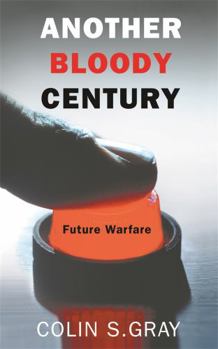The Future of War
Select Format
Select Condition 
Book Overview
How the wars of the near future will be fought and who will win them
Format:Paperback
Language:English
ISBN:0304367346
ISBN13:9780304367344
Release Date:May 2007
Publisher:Phoenix
Length:440 Pages
Weight:1.20 lbs.
Dimensions:1.3" x 5.5" x 8.4"
Customer Reviews
4 ratings
A realist's conversation on the future
Published by Thriftbooks.com User , 13 years ago
A great book written in the form of a frank discussion on what the future history of warfare will be. I would strongly recommend this for all interested in international relations, politics or military operations. Though it can be confronting at times, it offers all who read it a chance to re-examine their ideas of what the future will hold. The book aims to look at the future through the lens of history in order to understand what may be the shape of things to come. Gray clearly states his intellectual position as a realist and the case he presents, though compelling, may challenge the sensibilities of liberal internationalists. What I enjoyed most about this book is the almost conversational style with which it was written. This writing style creates the impression that Gray is actually sitting down with the reader to have a frank discussion about the subject. Such a style is useful in getting the reader to take in what is being argued and form their own opinion on the subject. In all, a book well worth reading.
A must read - provocatively stimulating, compellingly argued...
Published by Thriftbooks.com User , 15 years ago
This is a theoretical/philosophical/logical/historical/pragmatic look at war and warfare to come, and is one of the most engaging books I have read in quite some time. The author has a superb, and often wickedly delightful sense of humor that emerges unexpectedly throughout his text - he is particularly unkind to the multi-national, soft and fuzzy make peace not war can't we all be friends crowd. The book is worth buying just for the final two chapters - The Control of War and A Warlike Future - but I strongly recommend you read all the preceding chapters, nevertheless. Gray lays out, and eviscerates, the various grand theories of war - also those for controlling and eliminating war - and covers factors that do in fact limit war, if unevenly and unreliably. Throughout I found myself thinking how much I wish I had written THAT, or how intellectually satisfying it is to learn THAT. There is much to be learned here. Very satisfying, very stimulating, very provocative of serious thought...
Explores the idea that while war is ever changing, its basics remain the same
Published by Thriftbooks.com User , 17 years ago
ANOTHER BLOODY CENTURY: FUTURE WARFARE explores the idea that while war is ever changing, its basics remain the same: it'll always be with us, it has an unchanging nature and character, it's driven by politics, and it embraces strategic surprises. That said, ANOTHER BLOODY CENTURY narrows the focus to strategic prediction's problems, the fallacies inherent in the idea of a foreseeable future when warfare is involved, and futuristic types of warfare mechanisms which argues that in practice war is a controlled process. Any who would understand warfare's evolution and future must consider the basic tenants observed in ANOTHER BLOODY CENTURY: FUTURE WARFARE, which looks under the hype for the realities. Diane C. Donovan California Bookwatch
Fine study of warfare
Published by Thriftbooks.com User , 17 years ago
In this fascinating book, Colin Gray, Professor of International Politics and Strategic Studies at Reading University, continues the argument of his classic `Modern Strategy' - Clausewitz still rules. "Technology is important, but in war and strategy people matter most." There is no golden key to military success. His argument is that war and warfare will always be with us. War has an unchanging nature but a variable character, so history is our best guide to the future. Irregular warfare between states and non-state foes may be the dominant form of warfare for some years, but interstate war, including great power conflict, is not over. The political context is the main driver of war's incidence and character. Above all, warfare is political, though also social and cultural. Surprise in future warfare is certain. Efforts to regulate war by international political, legal and moral measures and attitudes are worth pursuing; however, perceived belligerent necessity can always trump them. His particular conclusions are unconventional but well argued: "the less active we are in attempting to speed reform in the Islamic world, the better. Such reform is the only comprehensively effective answer to Al Qaeda, but it cannot be imposed from outside." "Terrorism will neither vanish nor be comprehensively defeated (technically an impossibility, since it is a mode of warfare), but it may resume its more usual position as a permanent background danger, typically of much lesser gravity than interstate war." "nuclear weapons are useful. If they are not useful, why do the declared nuclear weapon states continue to hold them and why do others aspire to join their ranks? It so happens that biological, chemical, and radiological weapons also can be useful. The phenomenon that impedes comprehension and strategic empathy amounts to nothing less than demonization." However, in contrast to these realistic judgements, he espouses the idealist notion that the US state is the prime defender of `world order', a notion that whitewashes all those illegal US aggressions to enforce selfish US interests. So he joins Bush and Blair in opposing `efforts to regulate war' - "we need to be careful lest an ill-advised and undue respect for UN rules and procedures is permitted fatally to obstruct the forces of order, which is to say principally the United States." Bush and Blair see themselves as the sheriff and deputy of `world order', but why share their delusion?





